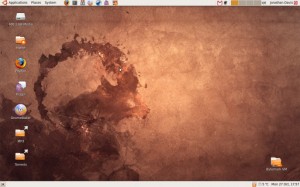As usual I like to write a brief review of the latest Ubuntu versions as they are released, or in my case when they hit the release candidate stage, as I hate trying to use the overcrowded repositories on release day.
8.10 isn’t a massive release by any measure, there are only several noticeable improvements, although it seems that a lot of time and effort has gone into making this release as stable as possible. For me, even though 8.04 was a LTS (Long Term Support) release, it seemed to lack the stability that I had come to love in Ubuntu, applications would crash for no reason, and I had massive conflicts with Flash9, Firefox and Amarok all trying to hog the sound output, with no end of frustration caused.

8.10 is a fantastic return to form for the Ubuntu team, the addition of Flash10 (despite it’s proprietary evilness) is a welcome upgrade as it solves a lot of the issues that dogged my daily web browsing sessions. Network manager has had some major improvements, now supporting VPN, Wireless, DSL, and mobile 3G broadband services, through a nice (although sometimes confusing) screen.
There’s the usual updates to X.Org, the kernel and Nautilus, the latter now providing a nice tabbed browsing interface, probably not something I’ll use, but I’m sure some people will see great uses for this. Nautilus is also now more tightly integrated with Pidgin, meaning things like status messages can be updated through the Gnome panel, a nice little addition. Another upgrade to File Roller means that it supports many more compressed archive types, which saves wasting time installing different archiving applications.
We also have the addition of an optional encrypted private directory, meaning your sensitive files can now be stored and encrypted very easily, although with the advent of the 2000 Regulation of Investigatory Powers Act, which forces citizens to hand over their encryption keys/passwords if requested by the authorities, this facility may have lost a lot of it’s advantage for some users.
Another nice little feature is the built-in guest account, something I have previously had to create myself, which allows you to quickly launch a low privilege password-less account, with absolutely no access to the file-system, in case your mate needs to quickly check his or her email on your laptop.
All in all I have found 8.10 to be rock-solid so far, and really wish that 8.04 LTS had offered this same high level of stability!
Be First to Comment